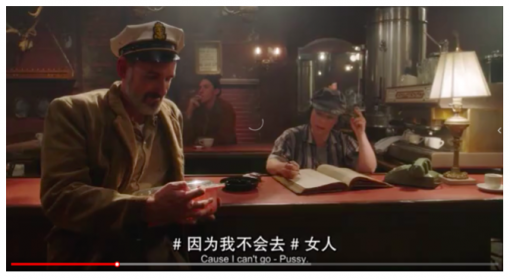By Siying Xiong
In my life experience, caption always located below the screen when I watching a movie in China. However, I realized that not all movie theaters around the world have subtitles after I came to United State. I remember that was the first time I fell asleep in the cinema since there were not captioning on the screen. My English was like a beginner when I first came to the United States, I was expected there has subtitle that helps me understanding the movie, but not. Therefore, I fell asleep because I cound not understand the plot. After that, I noticed the importance of the captioning. I agree with the importance of subtitles in the article of A Rhetorical View of Captioning. For example, Adding the closed caption is to promote social integration. Some people must rely on subtitles to understand the story, such as the hearing impaired, they lose some or all of their ability to listen to dialogue, then subtitles can help them understand the movie, let them enjoy the same movie as the hearing. In addition, in my country, most of the movie have bilingual subtitles that make foreigners understand Chinese movies, this embodied a culturally Fusion. Moreover, different people use different channels to absorb information. Especially, some people are not good at listening and are good at reading. Subtitles enable them to absorb the movie story efficiently.
However, I realized that there are so many errors appear in the bilingual translation that caused the misunderstanding meaning. For example, the Chinese movie “Youth”.

The word of ‘corrupting’ has been inappropriate use in this dialogue. The better word is insult or humiliate to replace. Another example in the TV show of the Marvelous Mrs. Maisel, when the Maisel walked away from the bar counter, the lady at the counter said: ‘Pussy.’ which translates to ‘woman’. It does not fit in the movie context. ‘Pussy’ refers to bitch somehow translated to woman instead that embodies the problem between the caption and translation. (Another reason is the Chinese law, the dirty word is forbidden on the screen.)

From those phenomena, the inaccuracy of bilingual subtitle translation is reflected. Inappropriate words are easy to mislead the audience to understand the plot. This requires translators to have a highly demanding professional approach to letter translation. When we relate to the reading of Zdenek A Rhetorical View of Captioning. One of the four principles of captioning indicates that “captioner must rhetorically invent and negotiate the meaning of the text.” The translation error happened in both Chinese translation and English translation. Which broke this principle of ‘negotiate’ the meaning in context. Inaccurate translation can result in a lot of side effects. For instance, the Spector may not be able to understand the jokes and affect the experience while watching the movie. My proposal is to encourage the United State government to add the English closed captioning below the movie. It not only helps non-English speakers have a better understanding of the movie content but also provides access for disabled people to equally enjoy the entertainment. At the same time, Chinese government better establish the requirements and regulations for subtitle translation, so that Chinese translator in the movie industry would pay more attention to the context of the bilingual translation, instead of translating it rigidly.